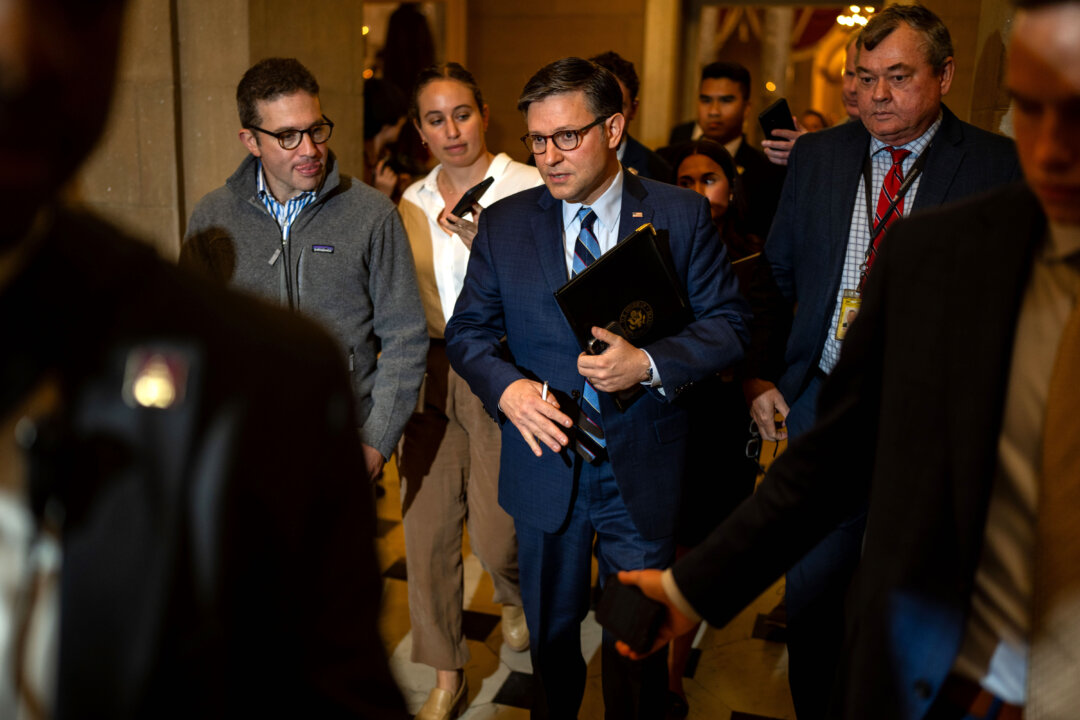Democrats have opposed the stopgap spending plan which includes a provision to require proof of citizenship to vote, saying existing laws already prevent this.
WASHINGTON—House Speaker Mike Johnson (R-La.) announced on Sept. 17 that his conference would stick with a temporary government funding proposal that includes an election security bill, which Democrats oppose, prolonging a Congressional impasse that could result in a government shutdown.
House Republicans have demanded that a continuing resolution (CR) to temporarily fund the government after the current fiscal year ends on Sept. 30 must include a bill known as the Safeguard American Voter Eligibility (SAVE) Act, which seeks to strengthen prohibitions on foreign nationals from voting in federal elections.
Democrats have opposed the bill, arguing that it may disenfranchise U.S. citizens by imposing new administrative requirements on them as they register to vote.
Some Republicans also oppose the stopgap bill due to its lack of spending cuts, which prompted Johnson to cancel a planned vote on the bill on Sept. 11.
On Sept. 17, however, Johnson indicated that he would schedule a vote on the CR with the SAVE Act included on Sept. 18.
He urged members to support the bill, citing the “immediate obligation” to secure elections.
“We owe this to our constituents. We will move forward on Wednesday with a vote on the 6-month CR with the SAVE Act attached,” wrote Johnson in a statement emailed to The Epoch Times.
“I urge all of my colleagues to do what the overwhelming majority of the people of this country rightfully demand and deserve—prevent non-American citizens from voting in American elections.”
It remains unclear whether Johnson has whipped a majority of votes in favor of the bill.
Many Republicans have told The Epoch Times they want a long CR so that, should their party win control of the White House and the Senate, they can pass permanent spending bills in 2025 of a more conservative character.
House Minority Leader Hakeem Jeffries (D-N.Y.) has said his caucus will oppose the bill, citing both the SAVE Act provisions and its six-month length.
“The Republican, so-called clean continuing resolution cuts veterans’ healthcare by $12 billion. It shortchanges our military readiness by $6 billion,” Jeffries said at a press conference on Sept. 12.
“It will result in the elimination of at least 2,000 jobs, it appears, from the Social Security Administration and undermine Social Security as we know it, and it will shortchange disaster assistance by about $25 billion.”
Republican opponents of the bill have said they’ll oppose the CR despite the SAVE Act, which they support.
The continuing resolution would not authorize new spending for the 2025 Fiscal Year, which begins on Oct. 1, but would merely continue spending at levels set for the 2024 Fiscal Year, which they oppose.
“I refuse to be a thespian in the Speaker’s failure theater. The 6-month continuing resolution with the SAVE Act attached is an insult to Americans’ intelligence,” wrote Rep. Thomas Massie (R-Ky.) on X.
“The CR doesn’t cut spending, and the shiny object attached to it will be dropped like a hot potato before passage.”
Rep. Jim Banks (R-Ind.), who is also the party’s U.S. Senate nominee in Indiana, wrote on X, “The awful omnibus we passed in March spent taxpayer dollars on abortions and gender transition for minors. Why would I vote to keep funding that nonsense? I’m a ‘no’ on the CR.
“Why would I vote to continue that spending when our national debt is over $35 trillion and growing by $1 trillion every 100 days?”
House Republicans only have a majority of four seats.
Johnson did not immediately respond to a request for comment about whether he had the votes.

